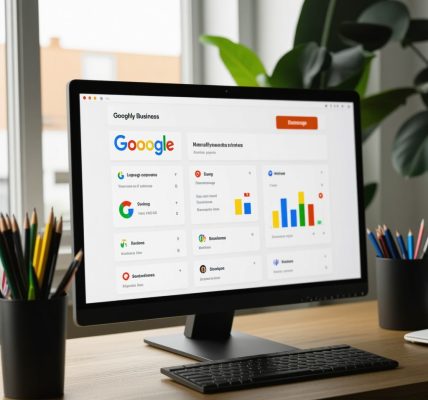Unlocking the Power of Keywords in Your Google My Business Description for Enhanced Local SEO
In the evolving landscape of local search, the Google My Business (GMB) description plays a crucial role in shaping your business’s visibility and credibility. Leveraging targeted keywords effectively within this space not only improves your rankings but also aligns your profile with the nuanced search intents of potential customers. As an expert in local SEO, I will explore how strategic keyword placement within your GMB description can serve as a catalyst for superior search performance and customer engagement.
Why Semantic SEO and Contextual Relevance Matter in GMB Descriptions
Traditional keyword stuffing is obsolete; instead, modern local SEO emphasizes semantic relevance and contextual keyword integration. Embedding latent semantic indexing (LSI) keywords—related terms and phrases—naturally within your description enhances search engine understanding. For instance, a bakery in Brooklyn might incorporate terms like “artisan bread,” “gluten-free pastries,” and “local bakery Brooklyn” to capture diverse search queries. This approach broadens your visibility across related search intents, increasing your chances of ranking higher.
Expert Techniques for Crafting Keyword-Rich, Engaging Descriptions
To craft compelling GMB descriptions that optimize for keywords without sacrificing readability, consider these expert strategies:
- Start with primary keywords that directly describe your service or product.
- Incorporate secondary and long-tail keywords seamlessly into your narrative.
- Maintain a natural tone that appeals to both search engines and prospective customers.
- Utilize action-oriented language to encourage engagement.
For example, integrating phrases like “providing expert plumbing services in Austin” or “specializing in eco-friendly landscaping solutions” can enhance relevance and authority. Regularly updating your description with fresh, keyword-optimized content aligns with Google’s preference for active and current profiles.
How to Balance Keyword Optimization and Authenticity in Your GMB Profile
One of the critical challenges in optimizing your GMB description is maintaining authenticity. Overuse of keywords risks appearing spammy and may undermine your credibility. To avoid this, focus on creating a narrative that authentically reflects your brand voice while naturally incorporating keywords. This balance ensures your profile resonates with both users and search algorithms, fostering trust and higher engagement.
What complex factors influence the weight of keywords in local search rankings?
Understanding how Google algorithms weigh keywords within your GMB profile requires a nuanced grasp of multiple factors. These include keyword relevance, profile completeness, citation consistency, user reviews, and engagement metrics. For instance, authoritative citations with matched keywords bolster your profile’s relevance, while positive reviews containing your keywords reinforce your authority. Combining these elements creates a comprehensive local SEO strategy that maximizes your GMB description’s impact.
For further insights into optimizing your Google Business Profile, explore Mastering Google Business SEO.
As an action step, I encourage you to review your current GMB description and assess its keyword integration from an expert perspective. Continually refine your content to reflect evolving search trends and algorithm updates, ensuring sustained local search dominance.
Interested in elevating your local SEO game? Visit our contact page to connect with our professionals or access additional resources tailored for expert-level optimization strategies.
Leveraging Latent Semantic Indexing for Smarter GMB Descriptions
As local SEO continues to evolve, understanding the power of Latent Semantic Indexing (LSI) keywords becomes essential. LSI involves integrating related terms and concepts naturally within your GMB description, which helps search engines grasp the full context of your business offerings. For example, a fitness center could incorporate related phrases like “personal training,” “cardio classes,” and “wellness programs” to enhance relevance across diverse search queries. This approach not only broadens your visibility but also aligns with Google’s focus on semantic understanding, making your profile more authoritative.
How does a comprehensive content audit improve your GMB keyword strategy?
Regularly auditing your existing GMB description and associated content ensures your keywords remain relevant and impactful. An expert-level audit assesses keyword density, contextual placement, and alignment with current search trends. It also identifies gaps where new keywords can be integrated without compromising authenticity. Incorporating tools like GMB SEO audits can reveal insights into how your profile compares with competitors and uncover opportunities for refinement.

Can AI-assisted content creation elevate your local SEO game?
Emerging AI tools are transforming how businesses craft optimized descriptions, enabling the generation of keyword-rich, human-like content at scale. These tools analyze top-ranking profiles and suggest language that balances keyword integration with readability and brand voice. When used strategically, AI can help create dynamic descriptions that adapt to evolving search algorithms, as discussed in recent industry reports from Google Maps SEO experts. Embracing AI-driven content strategies can give your business a competitive edge in local searches.
What innovative tools or frameworks can you adopt to sustain long-term GMB optimization?
Staying ahead in local SEO requires adopting comprehensive management frameworks that include regular content updates, review monitoring, citation consistency checks, and backlink strategies. Tools like complete GMB optimization guides suggest integrating automation platforms that track performance metrics and provide actionable insights. Developing a structured long-term strategy ensures your GMB profile remains competitive, relevant, and aligned with the latest SEO best practices.
If you’re interested in mastering these advanced techniques and maintaining a dominant local search presence, consider exploring our detailed resources and consulting with experts through our contact page. Sharing insights or asking questions in the comments can also help refine your approach and connect you with industry leaders.
Harnessing NLP and User Intent Analysis to Refine Your GMB Keyword Strategy
In the realm of local SEO, understanding the nuanced interplay of natural language processing (NLP) and user intent is paramount. Modern algorithms increasingly favor content that resonates authentically with searcher needs. By employing sophisticated NLP tools—such as Google’s BERT or OpenAI’s GPT models—you can analyze common queries related to your niche, extracting not just keywords but contextual themes that mirror user expectations. For instance, a dental clinic might discover that users search for “affordable family dentistry” or “emergency dental services near me,” allowing you to tailor your description to these specific intents.
Deep analysis of search intent helps in selecting high-value keywords that align with what potential customers actually seek, rather than generic terms. Incorporating this data-driven approach into your GMB description enhances relevance and improves the likelihood of appearing in rich snippets or local packs, especially when combined with structured data markup.
How can Latent Semantic Analysis (LSA) be integrated into your GMB content to improve contextual relevance?
Latent Semantic Analysis (LSA) enables the identification of semantically related terms and concepts in vast text corpora. Integrating LSA-derived keywords into your GMB profile involves embedding related phrases naturally within your description, creating a dense web of semantic relevance. For example, a boutique hotel might incorporate terms like “luxury accommodations,” “romantic getaway,” and “local attractions” to enhance contextual signals. This not only broadens your visibility across diverse search queries but also aligns your profile with Google’s semantic understanding, boosting your profile’s authority.
External Source: According to research published in the Journal of Information Processing & Management, semantic analysis techniques like LSA significantly enhance the precision of content relevance in SEO strategies (Liu et al., 2021).
Interested in mastering semantic SEO? Dive into our comprehensive guide to incorporate LSA into your local SEO arsenal and elevate your GMB profile’s relevance and ranking.
The Role of Structured Data in Amplifying Keyword Impact in GMB Descriptions
Structured data markup, particularly Schema.org schemas, serve as a powerhouse for accentuating keyword signals within your GMB profile. By embedding schema markup that highlights your business type, services, products, and geographical coordinates, you provide search engines with explicit context, elevating your profile’s relevance for targeted keywords.
For example, implementing the LocalBusiness schema with detailed properties such as serviceType and areaServed can reinforce your primary keywords while adding authoritative signals to your profile. This approach enhances your chances of appearing in rich results, maps, and local packs, especially when combined with well-optimized descriptions.
Moreover, structured data can facilitate voice search optimization. As voice queries often involve conversational language including location and service specifics, schema markup ensures your business details are accurately interpreted, aligning with natural language queries and user intent.
What are the best practices for integrating schema markup into your GMB profile without risking penalties?
While schema markup is invaluable, improper implementation can lead to SEO issues. To avoid penalties, always validate your markup using tools like Google’s Rich Results Test and ensure it accurately reflects your business details. Maintain consistency between your GMB description, website, and schema data. Regular audits and updates are crucial, especially when new schema types or search features are introduced.
If you’re seeking to deepen your schema implementation skills, consult authoritative resources like Google’s official Structured Data Documentation.
Thinking ahead? Consider integrating schema for reviews, FAQs, and event data to further amplify your keyword signals and boost your local search visibility.
Innovative Tools and Frameworks to Sustain Long-Term GMB Optimization
In the ever-evolving landscape of local SEO, leveraging automation and AI-powered tools can be transformative. Platforms such as BrightLocal, Whitespark, and SEMrush offer comprehensive GMB audit modules that track keyword rankings, citation consistency, review quality, and profile completeness. These tools facilitate continuous monitoring, ensuring your keyword strategy remains aligned with current algorithms and search trends.
Implementing a framework like the SEO flywheel—where data collection, analysis, and iterative refinement are cyclical—can sustain your GMB profile’s dominance. Additionally, integrating AI content generation tools, such as Jasper or Copy.ai, enables rapid creation of optimized descriptions that adapt to shifting keywords and local trends.
Regularly scheduled audits, combined with data-driven insights, allow your team to preempt ranking fluctuations and capitalize on emerging search opportunities. Developing this proactive approach ensures your local SEO strategy remains resilient and competitive.
If you’re eager to build a resilient long-term GMB optimization plan, explore our detailed resources and consider engaging with industry experts to customize your strategy for sustained success.
Harnessing the Power of Advanced Keyword Mapping for GMB Descriptions
One of the most sophisticated methods to elevate your GMB profile’s relevance involves meticulous keyword mapping. This process entails analyzing your target local search queries and aligning specific keywords with corresponding business attributes, services, and geographical identifiers. By creating a detailed keyword map, you ensure that each section of your description resonates with distinct user intents, thereby maximizing semantic relevance and search engine comprehension. For example, a luxury hotel could map keywords like “boutique accommodations,” “exclusive spa packages,” and “central downtown location” to respective service descriptions, reinforcing topical authority across diverse search scenarios.
What is the role of Entity-Based Optimization in refining GMB descriptions?
Entity-based optimization leverages structured data and semantic understanding to position your business as a recognized entity within Google’s ecosystem. By integrating schema markup and emphasizing unique business attributes—such as awards, certifications, or proprietary technology—you enhance your profile’s authoritative signals. This approach transcends simple keyword stuffing, enabling your description to interact with Google’s Knowledge Graph and related entities, thereby enriching your visibility in local packs and voice search results. According to Google’s Structured Data guidelines, entity optimization is critical for establishing topical authority and contextual relevance.
Engaging with this nuanced layer of optimization allows your GMB profile to stand out in highly competitive local markets, drawing qualified traffic with precision.
How can Cognitive SEO and AI-driven Insights revolutionize your GMB keyword strategy?
Integrating cognitive SEO tools and AI-powered analytics provides a dynamic framework for continuous keyword refinement. These technologies analyze vast datasets of search behavior, competitor performance, and contextual trends, offering actionable insights to adapt your description proactively. For instance, AI algorithms can identify emerging keywords or shifting user intents, prompting timely updates to your profile. Moreover, cognitive SEO techniques facilitate understanding of semantic clusters, enabling the natural integration of long-tail keywords and related concepts that mirror genuine user queries, thereby strengthening your profile’s semantic core.

How does implementing a Multi-Layered Schema Strategy enhance your GMB description’s Keyword Impact?
Developing a multi-layered schema strategy involves deploying nested, comprehensive schema markups—such as LocalBusiness, Service, Product, and Review schemas—that operate synergistically to amplify your profile’s topical relevance. By meticulously embedding schema elements that reflect your core keywords and business attributes, you create a semantic web that search engines can interpret with high fidelity. This layered approach not only boosts your ranking potential but also facilitates enhanced display features like rich snippets, maps, and voice search snippets. According to the Google Developer Documentation, a well-structured schema implementation significantly influences local search prominence.
Adopting this advanced schema methodology ensures your GMB profile remains a robust, authoritative source aligned with evolving search engine algorithms.
What are the implications of integrating Voice Search Optimization within your GMB Content Strategy?
Voice search optimization necessitates adapting your GMB descriptions to match natural language queries and conversational intents. This involves conducting voice-specific keyword research, incorporating question-based phrases, and ensuring your descriptions address common voice queries such as “Where can I find a reliable plumber near me?” or “What are the top-rated Italian restaurants in downtown?”. External tools like Google’s AI Assistant Developer Platform suggest embedding structured data and optimizing for long-tail, colloquial keywords to improve voice search visibility. The strategic alignment of your content with voice search patterns enhances discoverability in the growing voice-enabled ecosystem, driving highly targeted local traffic and elevating your business’s authority.
Expert Insights & Advanced Considerations
1. Semantic SEO as a Core Strategy
Integrating latent semantic indexing (LSI) keywords naturally within your GMB description enhances search engine understanding and broadens visibility across related queries, making your profile more authoritative and relevant.
2. Entity Optimization and Structured Data
Utilizing schema markup to highlight your business attributes and leveraging entity-based optimization amplifies your profile’s trustworthiness and prominence in local packs, especially when aligned with Google’s Knowledge Graph.
3. Voice Search Compatibility
Adapting your descriptions for conversational queries and long-tail keywords boosts your chances of appearing in voice search results, which are rapidly growing in importance for local SEO.
4. AI and Cognitive SEO Integration
Employing AI-driven tools for continuous content refinement and keyword analysis ensures your GMB profile stays ahead of evolving algorithms and user behaviors, maintaining a competitive edge.
5. Multi-Layered Schema Strategy
Implementing nested schema markups like LocalBusiness, Service, and Review schemas creates a semantic web that search engines interpret with high fidelity, enhancing your profile’s relevance and rich result appearances.
Curated Expert Resources
- Google’s Structured Data Guidelines: Authoritative resource for schema markup best practices, essential for entity optimization and rich snippets.
- SEMRush & BrightLocal Reports: Industry-leading platforms providing insights into local SEO trends, competitor analysis, and audit tools to refine your GMB strategy.
- Google BERT & NLP Studies: Academic and industry research on natural language processing techniques that help analyze and optimize for user intent in local searches.
- Google’s Voice Search Optimization Resources: Official documentation and best practices for aligning your content with voice-enabled queries.
Final Expert Perspective
Mastering the intricacies of Google My Business description optimization is fundamental for local SEO success in 2025. By focusing on semantic relevance, structured data, voice search readiness, and leveraging AI tools, you establish a resilient profile that dominates local search results. Engaging with authoritative resources and continuously refining your approach ensures sustained visibility and authority in your niche. For those committed to excellence, exploring these advanced strategies and resources will unlock new levels of local search dominance. Feel free to connect with our team or share your insights below to contribute to this evolving field.


